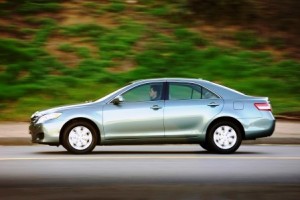Since problems with the Audi 5000 first put the term, “sudden acceleration,” in the public lexicon, consumers have filed complaints about virtually every automaker on the market. But a study of federal safety records from 2008 show that an overwhelming number of those complaints target a single manufacturer: Toyota.
A search of 5,916 complaints filed with the National Highway Traffic Safety Administration last year shows that Toyota and its luxury brand, Lexus, account for 41% of all those incidents that appear to involve unintended acceleration, according to an extensive study conducted by Consumer Reports.
In October, Toyota announced that it would recall 3.8 million vehicles which it said could have driver floor mats jam the accelerator pedal – creating a situation like sudden acceleration. The recall was triggered by the growing body of complaints filed with NHTSA – and news reports of an accident in which a California state trooper and three members of his family were killed in the fiery crash of a Lexus ES350.
Toyota has since said that it would stage a two-step fix, initially, it would advise dealers to saw off the bottom ¾ inch of the accelerator pedals involved in the recall; then, starting in April, customers would be asked to return to their dealers to have a replacement pedal installed. On some Toyota models, a brake interlock would also be added, disengaging the engine when a customer steps on both brake and gas pedals simultaneously.
(NHTSA eventually cleared the Audi 5000 of having any mechanical defect, but the automaker ultimately redesigned the layout of its pedals to prevent drivers from inadvertently stepping on the accelerator rather than the brake.)
Consumer Reports noted that it looked at owner complaints to the NHTSA in 2008 to avoid any bias created by recent headlines about the Toyota recall. Media coverage of safety problems often results in an increase in the number of complaints filed with federal regulators.
The magazine three complaints as typical of those filed with NHTSA:
“This Ford F-150 pickup truck has the widest gas (accelerator) pedal I have ever seen and as a result my right foot continues to press down on it, even after I have started applying the brake pedal with the same foot.”
“I entered the vehicle, started the engine, and put the vehicle in drive. The engine immediately increased in rpm to the point where the rear tires began spinning on the gravel. I put the transmission in Neutral and the engine rpm increased. I removed my foot from the brake and the engine continued at a very high rpm. I then depressed and released the accelerator and the engine returned to a normal idle.”
“…the truck spontaneously accelerated at full throttle with my foot firmly on the brake… I was advancing without applying the accelerator. With the brakes fully applied, I continued to advance into the parking lot and I immediately shifted into Park in attempt to stop the vehicle. The vehicle came to a stop and the engine was racing at full throttle in Park.”
While Toyota accounted by far for the largest number of sudden acceleration complaints, Ford was also named in a number of incidents, making up about 28% of the total. Chrysler was a distant third on the list, with 9% of the complaints. Meanwhile, General Motors accounted for about 5%. Based on 2008 sales, that works out to one complaint for every 50,000 Toyotas compared with one in 500,000 GM vehicles, Consumer Reports noted.
While Toyota has consistently argued that floor mats are responsible for the problem behind its massive recall, many consumers have insisted that there were other causes. A class action lawsuit, filed last month in California, contends there may be an unknown glitch with electronic sensors or controllers, a charge the automaker vehemently denies.
But Toyota’s situation has been worsened by several other safety issues, including the recall of 110,000 Tundra pickups prone, as the government states, to “excessive corrosion,” which could lead to brake failure and spare tires falling off the trucks.
Meanwhile, the NHTSA is investigating whether the 2006 Corolla and Matrix models are prone to unexpected stalling, which owner complaints allege can occur even at highway speeds. If found to be a documentable problem, the government could order the recall of nearly 400,000 of the vehicles.
Concluding its study, Consumer Reports cautioned that, “Toyota has announced several steps it is taking to mitigate the risks of floor-mat entrapment and provide ‘smart throttle’ technology (allowing the brake pedal to override the accelerator), but our analysis indicates other problems likely exist.”

